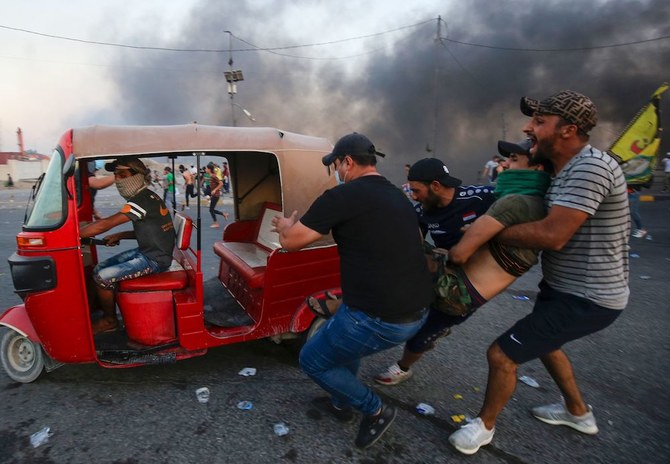BAGHDAD: At least nine more people were killed in Iraq on Saturday as the death toll from six days of protests neared 100, with nearly 4,000 injured. Most of the dead were protesters.
The UN demanded an end to the violence. “Five days of … deaths and injuries; this must stop,” said Jeanine Hennis-Plasschaert, the secretary general’s special representative in Iraq.
She described the violence as a “senseless loss of life” and said those behind it must be held accountable.
Hours after a curfew in Baghdad was lifted on Saturday, protesters began gathering in the streets around Tahrir Square.
Armored vehicles and troops sealed off the area, while special forces and army vehicles deployed around the square.
Four people were killed when security forces fired at protesters in a street near the square. Hundreds of protesters retreated from tear gas and live fire by security forces, but at least three more were killed by gunfire. Another protester was killed and 13 injured in the southern Baghdad neighborhood of Zafaraniyah. Nearly 40 people were wounded in the capital.
Security forces broke up the main protest outside the Oil Ministry into smaller isolated groups, and conducted house-to-house searches.
Thousands of protesters took to the streets in the southern cities of Nasiriyah and Diwaniyah, defying a curfew that was still in place there.
In Diwaniyah, at least one protester was killed as demonstrators marched toward local government offices. In Nasiriyah, demonstrators torched the offices of three political parties and a member of parliament, and security forces responded with gunfire.
The demonstrations — which have evolved from initial demands for employment and better services to the fall of the government — carried on into the night in various neighborhoods of Baghdad and southern Iraq, as authorities struggled to agree a response.
The authorities accused unidentified snipers of shooting into the crowd and said they were searching residential neighborhoods for those responsible.
The mainly young, male protesters have insisted their movement is not linked to any party or religious establishment and have scoffed at recent overtures by politicians.
Parliament’s human rights commission said Saturday that most of those who have died in the last five days fell in Baghdad, while 250 other people were treated in the capital for sniper wounds.
“We demand clarification from the Iraqi government on those wounded in Baghdad by sniper fire, which is ongoing today,” the commission said.
Parliament had been due to meet at 1 p.m. but could not reach quorum, after firebrand cleric Moqtada Al-Sadr’s bloc of 54 lawmakers and other factions boycotted the session.
The former militia leader threw his weight behind the demonstrations on Friday with a call for the resignation of Prime Minister Adel Abdel Mahdi.
Sadr’s movement has the power and organization to bring large numbers of supporters onto the streets, but at the risk of alienating many of those whose protests in recent days have been based on rejecting all of Iraq’s feuding political factions.
Parliamentary speaker Mohammed Al-Halbousi had extended a hand to protesters saying “your voice is being heard.”
But one protester said late Friday “these men don’t represent us.”
“We don’t want parties anymore. We don’t want anyone to speak in our name.”
Iraq has a population of just under 40 million people, and is currently the fifth-largest oil producer and exporter worldwide, and the second-largest OPEC producer.
Youth unemployment stands at 25 percent, twice the overall rate, according to the World Bank which adds that an estimated 22.5 percent of the population was living in poverty in 2014.
The largely spontaneous protests have presented the biggest challenge yet to the Iraqi premier, who came to power a year ago as a consensus candidate promising reforms but whose response to protesters has been seen as tepid.
“Abdel Mahdi should have come forward with decisive changes, like the sacking of leading politicians accused of corruption,” said Iraqi analyst Sarmad Al-Bayati.
Authorities restricted access to Facebook and Whatsapp after anti-government demonstrations began on Tuesday, before ordering a total network shutdown on Wednesday.
Political and religious rifts run deep in Iraq, and protests are typically called for by party or sect — making the last five days exceptional, said Fanar Haddad an expert at Singapore University’s Middle East Institute.
“This is the first time we hear people saying they want the downfall of the regime,” Haddad said.
Sadr, a former militia leader turned nationalist politician, demanded on Friday that the government resign to clear the way for a fresh election supervised by the United Nations.
His bloc is the largest in parliament, and his intervention sets the scene for a possible showdown with the speaker, who has made his own bid to make political capital out of the protests.
Halbusi sought to allay protesters Saturday by announcing in a news conference a long list of promised reforms over employment and social welfare, but it was not clear he would succeed in appeasing the demonstrators.
Iraq’s Shiite spiritual leader Grand Ayatollah Ali Sistani used his weekly Friday prayer sermon to urge authorities to heed the demands of demonstrators, warning the protests could escalate unless clear steps are taken immediately.


















